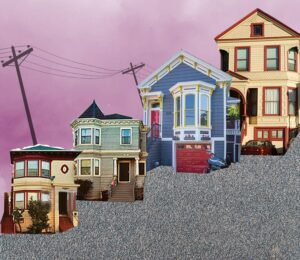This summer, The Campanil’s Online Editor Melodie Miu attended the four-week multimedia journalism study abroad program The Perpignan Project in southern France. After weeks of hard work and sweat, she took a weekend detour to travel to Paris with new friends.
Awakened by her experience, she decided to write about it.
A petite woman approached my friends and me while we were picnicking in the grassy park facing the Eiffel Tower and asked us if we spoke English. With quizzical looks, we nodded yes. Silently, she handed us a slightly wrinkled piece of paper with a handwritten paragraph. As I read it, my jaw dropped; my bite of sandwich nearly fell out of my mouth. The note summed up the story of her month’s stay in Paris, the poverty she had experienced back home and her plea for our donation toward her brother’s leukemia fund.
I stared back at her, taking in her appearance. She didn’t look much older than us and wore long, modest clothing and had her hair braided into a plait. The woman appeared to be Eastern European and was obviously someone who wasn’t in Paris for a vacation.
I felt very sorry for her afterward, and regretted telling her, “No, I can’t help you.” That is, until her twin sister approached us at the Notre Dame Cathedral with the same note. Then another one came … and another … and another.
I couldn’t believe I had been so naive. It didn’t even occur to me that we were being scammed when my friend offered the first woman some of her lunch and she refused. Or when her most eye-catching accessory was a necklace with a giant wooden cross around her neck to draw attention from sympathetic Christians. And that note was just too perfect.
I was always warned about pickpockets and con artists roaming the streets of Europe and it wasn’t even my first time in Paris, so I felt stupid and was angry about the whole thing. How dare she, how dare THEY?
I gradually calmed down and accepted the situation. The rage that had built up in me was replaced with great sadness. The mirage disappeared and I began seeing my surroundings differently. Suddenly, France no longer looked as lovely.
Before going on my weekend trip to Paris, I had received an e-mail from a faculty member of The Perpignan Project after I wrote my first blog post about how, while staying in France, my ethnicity and gender contributed to misconceptions about my identity. He said he was relieved to see a critical piece on the website and perhaps in an effort to lighten the situation, he told me if I traveled farther, I would find “few racists in France.”
It was one of the most complicated messages I’ve ever read. I don’t think he was experiencing the same country that I was.
Take, for example, La Ville Lumière – Paris, the city of lights. It is the most visited destination on Earth, the Eiffel Tower being its most iconic symbol of beauty and human achievement. You’d think I would feel weirded out by the clichéd romanticism frothing all over the place but to be honest, I love Paris. I didn’t realize how much I loved the city until I traveled there with new friends. I know I have only touched the very surface of its many diverse layers.
Yet as much as I would love to keep on my rose-tinted glasses, I can’t accept Paris as a whole without also accepting its truly ugly, tragic parts.
If there were so few racists here, then why is that the note-giving woman and her fellow collectors are not white? Why is it that only black and Arab men are standing on every corner of the city hawking cheap miniature Eiffel Tower figures, fake Louis Vuitton bags and bottled water in iced buckets, barking “Euro, one euro”? Why is it that I hear other English-speaking tourists gossiping about those people conning them out of their hard-earned money –- spitting out the word “gypsy” with such disdain?
I had to ask myself: what would the difference be if I gave that first woman a euro or two? She could easily find another group to hand the note to and probably extract even more money. Everyone she approached would be made the fool.
However, I can’t be mad at her for that. I don’t think she or anyone else in her position would want to continue conning others but perhaps they have to in order to survive. Really, everybody should be mad at the system in place for perpetuating such incredible levels of injustice. Most likely, we all are pretty pissed off right now but there is still a real lack of action being taken to stop it from happening over and over again.
I often hear about beggars making more money from change-collecting in a day than an average salary worker would earn in a year. Those kinds of absurd stories incense many of my peers and has helped to drive the mainstream population to look down on the poverty-stricken. Whether or not those kinds of stories are true, when you hear about generosity being taken for granted so often, giving change or acknowledging the homeless becomes stigmatized.
There is a real shame in being poor.
And when you look at who are the most effected by scarcity, you see people of color. You probably only see people of color.
This post has also been published on The Perpignan Project Website.
Read her other posts here:
An act of charity
Being my own chef
Feeling foreign and far away from home
VIDEO: This woman’s place is in the kitchen




